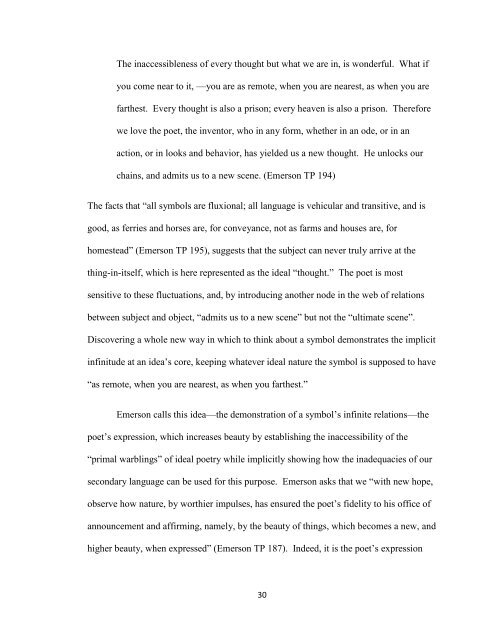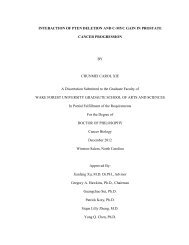RALPH WALDO EMERSON AND THE EVER-EVOLVING ART OF ...
RALPH WALDO EMERSON AND THE EVER-EVOLVING ART OF ...
RALPH WALDO EMERSON AND THE EVER-EVOLVING ART OF ...
You also want an ePaper? Increase the reach of your titles
YUMPU automatically turns print PDFs into web optimized ePapers that Google loves.
The inaccessibleness of every thought but what we are in, is wonderful. What if<br />
you come near to it, —you are as remote, when you are nearest, as when you are<br />
farthest. Every thought is also a prison; every heaven is also a prison. Therefore<br />
we love the poet, the inventor, who in any form, whether in an ode, or in an<br />
action, or in looks and behavior, has yielded us a new thought. He unlocks our<br />
chains, and admits us to a new scene. (Emerson TP 194)<br />
The facts that “all symbols are fluxional; all language is vehicular and transitive, and is<br />
good, as ferries and horses are, for conveyance, not as farms and houses are, for<br />
homestead” (Emerson TP 195), suggests that the subject can never truly arrive at the<br />
thing-in-itself, which is here represented as the ideal “thought.” The poet is most<br />
sensitive to these fluctuations, and, by introducing another node in the web of relations<br />
between subject and object, “admits us to a new scene” but not the “ultimate scene”.<br />
Discovering a whole new way in which to think about a symbol demonstrates the implicit<br />
infinitude at an idea’s core, keeping whatever ideal nature the symbol is supposed to have<br />
“as remote, when you are nearest, as when you farthest.”<br />
Emerson calls this idea—the demonstration of a symbol’s infinite relations—the<br />
poet’s expression, which increases beauty by establishing the inaccessibility of the<br />
“primal warblings” of ideal poetry while implicitly showing how the inadequacies of our<br />
secondary language can be used for this purpose. Emerson asks that we “with new hope,<br />
observe how nature, by worthier impulses, has ensured the poet’s fidelity to his office of<br />
announcement and affirming, namely, by the beauty of things, which becomes a new, and<br />
higher beauty, when expressed” (Emerson TP 187). Indeed, it is the poet’s expression<br />
30




